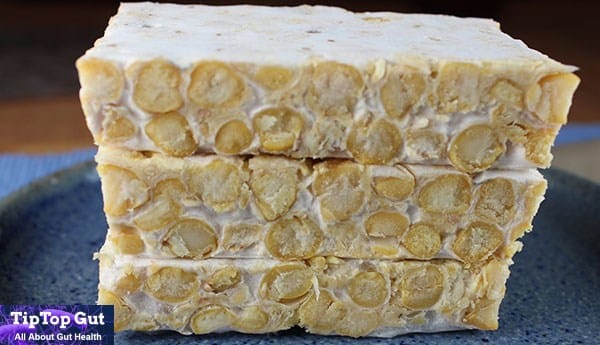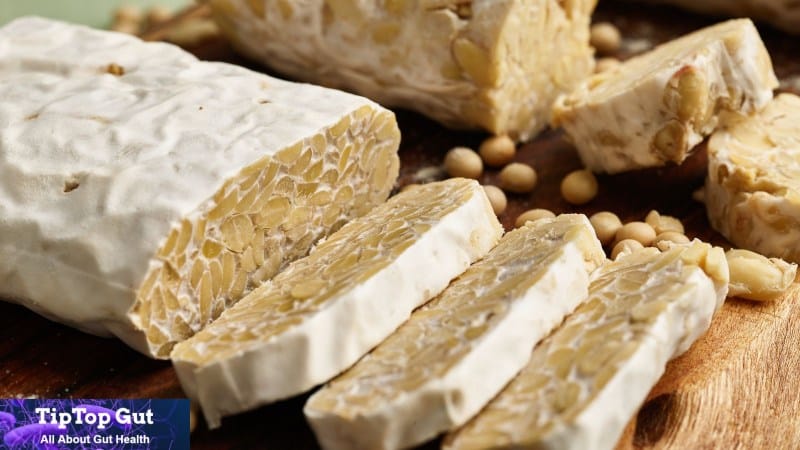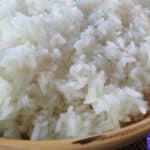Originally from Indonesia, tempeh is a traditional soy product. It is a well-known meat substitute produced from fermented, cooked soybeans.
The outer layer of soybeans is removed after they have been soaked overnight, dehulled, cooked, and chilled before being combined with a starter culture containing rhizopus mould spores. The beans are allowed to ferment for a few days, forming a cake-like structure while they do so.
Indonesians have made this bean cake with a nutty flavor for hundreds of years. It is created using partially cooked soybeans and fermented with rhizopus, a type of mold. A white, fuzzy material that holds the tempeh together can be seen. Mycelium is a harmless byproduct produced by the fungus.
Tempeh is not frequently seen in supermarkets, but you can get it online or at health food stores. You can also prepare it yourself at home. Is Tempeh good for gut health? Let’s explore it.
Is Tempeh Beneficial to Gut Health?
Particularly fiber that is known to be prebiotic is abundant in tempeh. The good bacteria in the stomach are fed by this fiber, which supports their growth and population. Short-chain fatty acids are substances that many of these gut bacteria make that are good for our overall health and the gut’s health.
Tempeh Affects the Gut Flora
In the fermentation process, yeast and bacteria break down carbohydrates. In soybeans, the fermentation procedure reduces phytic acid, which aids in better absorption and digestion.
Probiotics may be present in fermented, unpasteurized foods. When consumed, these advantageous bacteria might provide health benefits.
A probiotic food that affects your gut microbiome is tempeh. Your digestive system’s resident bacteria make up your gut microbiota. Additionally, it appears to be high in prebiotics, a class of fiber that aids in the growth of good bacteria in the gastrointestinal tract.
Prebiotics, according to studies, promote the production of short-chain fatty acids in the colon. One of these is butyrate, the colon’s lining cells’ main energy source.
According to evidence, prebiotic pills may alter gut flora positively. While studies have shown conflicting findings, some have linked prebiotic consumption to increased bowel movements, decreased inflammation, and enhanced memory.
Read More:
Best Probiotic for Gut Health and Bloating: According to Health Experts
Tempeh has Both Prebiotics and Probiotics
Tempeh offers more than just stress-free toilet trips when it comes to digestive wellness. According to the National Institutes of Health, probiotic microorganisms are distinct species of bacteria and yeast that might affect your gut’s natural microbiome. These microorganisms are found in fermented foods, including tempeh, kefir, kombucha, and sauerkraut (NIH).
According to the NIH, these probiotics can strengthen the gut’s barrier (which is necessary for the gut’s functionality and is associated with intestinal disease when impaired) and improve intestinal transit (i.e., speed up the rate at which food moves from your top to your bottom). They can also prevent harmful microorganisms from growing in the gastrointestinal tract.
Soybeans also contain prebiotic dietary fiber, a non-digestible substance that controls the makeup and activity of the microbiome in your gut. According to Feller, prebiotics passes through the entire GI tract until they descend farther into the colon, where they undergo fermentation. “The prebiotics act as food for the probiotics throughout that fermentation process, which supports the development of the healthy gut flora.”
According to Feller, the probiotics and prebiotics in this two-for-one supplement can improve your gut and general health. In addition to affecting metabolic health, the combination is also beneficial for gut health, which is crucial because the gut plays a large role in immunological function.
Tempeh Nutrition Profile
The nutritional breakdown of 100g of tempeh is as follows:
- 166Kcal / 697KJ
- Protein – 20.7g
- Fat – 6.4g
- Carbohydrate – 6.4g
- Fiber – 5.7g
- Iron – 3.6mg
- Calcium – 120mg
- Magnesium – 70mg
- Phosphorus – 200mg

Tempeh Health Benefits
Following are some of the health benefist of Tempeh.
1. Probiotics Rich
Foods that have been fermented and contain probiotics have various advantages. Salmonella and E. coli-resistant linings in the intestines are made possible by the microflora that inhabits fermented foods.
Tempeh and other fermented foods can aid in boosting the number of healthy gut bacteria, which can significantly impact health.
Studies have shown probiotics to help regulate dangerous bacteria in the body, fight diarrhea, ease indigestion, reduce chronic inflammation, and even enhance immune system performance. They can also help break down sugars and carbohydrates, making them easier to digest.
2. Improves Bone Health
The calcium in tempeh is essential for the development and upkeep of bones. To maintain bone mineral density and avoid weak, brittle bones and fractures, calcium is required, along with other vital minerals like vitamin K and vitamin D.
It contributes to the formation of the mineral combination known as hydroxyapatite, which hardens your teeth and bones, preserves bone density, and aids in bone healing. According to studies, those deficient in calcium are more likely to have weak and malleable bones, which increases their risk of fractures.
The growth of bones is influenced by copper, another element found in tempeh. A copper shortage can cause osteoporosis, limited strength, weak muscles, and brittle, easily broken bones that have not fully developed.
According to a study published in Biological Trace Elements Research, copper consumption can speed up the healing of bones and may also be essential for tissue maintenance and repair.
3. Controls Cholesterol Level
High cholesterol levels are a significant risk factor for developing heart disease. It may become more difficult for your heart to pump blood throughout your body due to your arteries being stiff and narrowed from high cholesterol.
Soy isoflavones, which are present in tempeh and other soy products, can dramatically lower levels of total and LDL cholesterol, according to an analysis of 11 research published in the American Journal of Clinical Nutrition.
Niacin, which may be found in tempeh, is another significant nutrient for regulating cholesterol levels. It is frequently used as a treatment for lowering cholesterol. Niacin can boost levels of good HDL cholesterol, which aids in the removal of fatty plaque from the arteries, in addition to lowering triglyceride and harmful LDL cholesterol levels.
Niacin supplements are very effective at naturally lowering cholesterol, particularly for people who are at an increased risk for heart attack or stroke due to high LDL cholesterol, low HDL cholesterol, or elevated triglyceride levels, according to a 2011 study from the University of Kansas Medical Center.
Read More:
Biotics 8 Review: SCAM or A Legit Probiotic for Men?
4. Offers Protein for Muscle Growth
With almost 16 grams of protein in just one three-ounce serving, tempeh is a fantastic source of plant-based protein. In terms of protein content, it is on par with many other foods like chicken or beef. Not only that, but the fermentation procedure has already assisted in converting some of the protein into amino acids, minimizing the work needed by your digestive system.
Protein is crucial because it boosts energy, maintains blood sugar stability, and keeps our metabolism functioning. Every cell in the body uses protein, essential for building muscle, sustaining neurological health, assisting with digestion, balancing hormones, and preserving a positive outlook.
You can also lose weight and reduce your waistline by including high-protein foods like tempeh. For instance, one study found that increasing protein intake by merely 15% led to greater satiety and lower calorie intake. The study was published in the American Journal of Clinical Nutrition.
5. Might Have Cancer-Preventive Qualities
The isoflavones in tempeh have been linked to several health benefits and are highly regarded for how well they fight inflammation. This is so because soy isoflavones are loaded with antioxidants, which fend off free radicals and aid in reducing inflammation to shield cells from harm.
Antioxidants are considered crucial to both health and disease, and some studies suggest that they may help lower the chance of developing chronic diseases like cancer, diabetes, and heart disease.
That soy isoflavones may potentially be capable of inhibiting the formation and development of cancer should not come as a surprise, according to some recent research. Soy isoflavones, for instance, have been shown to reduce the production of estrogen and change metabolism away from gene-damaging metabolites and toward inactive metabolites, both of which may help prevent cancer.
6. Might Lessen Menopause Symptoms
It is known that the isoflavones in tempeh can relieve menopausal symptoms naturally. The North American Menopause Society studied the impact of isoflavones on menopausal health, and the results showed that isoflavones could help control blood cholesterol levels. An abrupt increase in cholesterol levels might be one of the telltale indicators of menopause, along with hot flashes and mood swings.
Some studies even suggested that isoflavones could lessen the frequency and intensity of hot flashes, albeit the results were conflicting. Researchers propose promoting isoflavone-rich whole foods to menopausal women to take advantage of the potential cardiovascular benefits, while more research is required to establish precise amounts.
It was shown that using soy protein supplements for 100 days had cancer-treating benefits compared to a control group in the study, which recruited 12 healthy premenopausal women.
7. Controls Blood Sugar
Tempeh is a tasty and wholesome way to meet your daily requirements for this essential mineral, with one meal covering up to 54% of your needs for manganese. The creation of nutrients, including cholesterol, carbs, and proteins, is one of the many chemical reactions involved in manganese.
The capacity of manganese to support normal blood sugar levels and prevent diabetes is one of its most recognized advantages. Studies demonstrate how manganese is essential for the healthy development of digestive enzymes involved in a process known as gluconeogenesis. The process of gluconeogenesis entails turning the amino acids in proteins into sugar and maintaining a healthy level of sugar in the blood.
Read More:
Is Kimchi Good for Gut Health? Truth Revealed with Research
Where can We Find Tempeh, and How to Use It?
Because of its steadily increasing popularity, you can easily find tempeh at most large grocery stores and supermarkets. You can generally find it in the refrigerator section, among other vegetarian products like tofu and meat alternatives.
Flax, soy, bean, barley, or three-grain tempeh are a few examples of the frequently offered types. Find your favorite by experimenting with them and reaping the numerous possible tempeh advantages.
You may even make tempeh at home using a starter culture if you’re daring. While there are many comprehensive instructions for preparing homemade tempeh online, most require soaking, splitting, and boiling the soybeans before allowing them to ferment for up to 48 hours.
While raw tempeh is technically edible, it typically lacks flavor and is not advised. Thankfully, quick, simple, and delectable recipes for tempeh exist, such as those for roasted, sautéed and pan-fried versions.
There are numerous ways to prepare tempeh so that you may start incorporating it into your favorite dishes, including baked, smoked, barbecued, and other methods.
Try adding pan-fried tempeh crumbles to your next salad for a little more texture and taste. Instead, experiment with adding crispy tempeh to stir-fries, sandwiches, or wraps to boost your meal’s nutrient content and health advantages.
Concluding Now! Is Tempeh Good for Gut Health?
Foods made from soy that are rich in isoflavones include tempeh and tofu. Tofu has more calcium than tempeh; tempeh is higher in prebiotics and has far more protein and fiber.
Tofu has a more neutral flavor, but tempeh has an earthier flavor. Whichever you select, eating any of these items is a fantastic way to enhance your isoflavone intake and improve your general health.
FAQs about Tempeh and Gut Health
Is tempeh inflammatory in nature?
Tempeh has high antioxidants and amino acids among the most popular fermented soybean products in South East Asia which may help explain its potential anti-inflammatory effects.
Does tempeh contain probiotics or prebiotics?
Even though tempeh is a fermented food, it is frequently cooked before consumption, and some commercial varieties are also pasteurized, making it unlikely that they would retain the probiotics. However, tempeh has a lot of fiber, particularly the prebiotic kind.
Is eating tempeh daily healthy?
Soy products like tempeh can help lower your cholesterol by including heart-healthy fiber, isoflavones, and other phytochemicals.
Does tempeh help leaky gut?
Probiotic meals not only assist in repairing leaky guts but also boost immunity, shield the digestive system from pathogenic bacteria, and prevent constipation. Yogurt, kimchi, sauerkraut, pickles, tempeh, kombucha, and other foods contain probiotics in high concentrations.
Does tempeh make you bloat?
In most cases, tempeh doesn’t result in gas or bloating. For those who suffer from a digestive issue like irritable bowel syndrome, it makes it a decent substitute for beans.
Read More:
Is Yogurt OK for IBS? Shocking Facts Revealed
Is Celery Juice Good for Gut Health? Truth Revealed
Are Sweet Potatoes Good for Gut Health? Explore the Truth
What Happens If You Eat Too Many Tomatoes? Alarming Facts
Is Matcha Good for Gut Health? Interesting Facts Unveiled
Best Probiotic for Vaginal and Gut Health: The Best Guide 2022
Sources and References
At TipTop Gut, we rely on peer-reviewed studies, academic research institutions, and medical associations. We avoid using tertiary references.
- Self.com
-
McLoughlin RF, Berthon BS, Jensen ME, Baines KJ, Wood LG. Short-chain fatty acids, prebiotics, synbiotics, and systemic inflammation: a systematic review and meta-analysis. Am J Clin Nutr. 2017 Sep 1;106(3):930-945. doi: 10.3945/ajcn.117.156265. PMID: 28793992.
-
Halton TL, Hu FB. The effects of high protein diets on thermogenesis, satiety and weight loss: a critical review. J Am Coll Nutr. 2004 Oct;23(5):373-85. doi: 10.1080/07315724.2004.10719381. PMID: 15466943.
-
Ahmad A, Ramasamy K, Majeed AB, Mani V. Enhancement of β-secretase inhibition and antioxidant activities of tempeh, a fermented soybean cake through enrichment of bioactive aglycones. Pharm Biol. 2015 May;53(5):758-66. doi: 10.3109/13880209.2014.942791. PMID: 25756802.
-
Taku K, Umegaki K, Sato Y, Taki Y, Endoh K, Watanabe S. Soy isoflavones lower serum total and LDL cholesterol in humans: a meta-analysis of 11 randomized controlled trials. Am J Clin Nutr. 2007 Apr;85(4):1148-56. doi: 10.1093/ajcn/85.4.1148. Erratum in: Am J Clin Nutr. 2007 Sep;86(3):809. PMID: 17413118.
- BBC Good Food
- WebMD
-
Hachmeister KA, Fung DY. Tempeh: a mold-modified indigenous fermented food made from soybeans and/or cereal grains. Crit Rev Microbiol. 1993;19(3):137-88. doi: 10.3109/10408419309113527. PMID: 8267862.

















